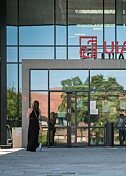Debatt ● Amine Fquihi
We react strongly to the budget proposal
The result will be that only those in the world who are wealthy will be able to come to study in Norway, Amine Fquihi, national president of ISU, writes.

International students union in Norway (ISU) reacts strongly to the budget proposal from the government for supporting the introduction of tuition fees for international students.
For decades, Norway has been unable to meet its target of sending 20-50 percent of Norwegian students abroad. International students are an important part of the concept of «internationalisation at home». We bring the world to Norway and are ambassadors for Norway when we return home.
Academically, international students enrich the study environment at institutions of higher learning - carrying with us our home institutions different approaches to knowledge in different fields. Storting report St. 7 (2020-2021) released by the Education Ministry released a document referring to «Education as a Tool for Increasing the Quality of Education».
Education as a concept involves opening up oneself to new experiences, knowledge, and understanding. Having an international student in the classroom is visual proof to the Norwegian student that there is a whole world of experiences that they have not been able to live - and that they have access to - through dialog and group work with that international student.
Solutions to global problems including sustainability and the rise of extremism can begin to be approached through the exchanges in the classroom of Norwegian university. The suggestion of turning away from free education will lead to less understanding of the limitations of our point of view.
It is correct that Norway should remain an example to the rest of the world not only in peace and equal opportunity and not just in words, but in the practice of maintaining free education for all. What we need is increased internationalization - to prepare students for an international work environment - one will find itself both inside and outside of Norway. The intercultural competence and networks built will strengthen Norway and reflect the increased diversity in the country due to migration. Increased international competence is increasingly important in today's world.
International students are not studying here «for free», on the contrary, those from outside Europe have to show the equivalent of a Lånekassen amount every year to study here. International students from inside and outside of Europe have to contend with the high cost of living in Norway. Many work part-time to support themselves, paying taxes while doing so, and have to contend with a smaller pool of available jobs because they don't speak Norwegian. The Education Minister should be celebrating international students who work part-time!
If tuition fees are introduced for international students, many bright, yet poorer, students from around the world will not be able to access an education that would help them rise out of the limitations that their economic and social background has placed them in. By introducing tuition fees, yet another barrier will be created. The result will be that only those in the world who are wealthy will be able to come to study in Norway. Norwegians will effectively push away students in the world who are poorer, limiting both opportunity and diversity in Norwegian universities.
Norway will have a hard time competing with the rest of the world for international students if tuition fees are introduced here. Why study in Norway - with its higher cost of living and unique language that acts as a barrier - when you can study a wider range of subjects in an English-speaking country with not such a high cost of living? We maintain that the additional cost carried by the studentsamskipnaden in guaranteeing housing (which international students pay rent - they do not get for free!) is more than compensated by the value of Internationalisation at Home.
Our colleagues in other Scandinavian countries confirm the disastrous consequences of tuition fees introduced for them. 90 percent drop-offs in international student enrollment, and an increasing view of the international student - and the native student - as a dollar sign by the institutions of higher education. An overall increased focus on Education-for-Profit is not a step in the right direction for Norway.











Nylige artikler
Vitenskapsakademiet om Trumps USA: — Nå må vi snakke med høg utestemme
Vi drukner i verdiløse publikasjoner
Student tapte i retten — får ikke gjennomføre praksis i sykepleierstudiet
Desse studentane gjekk 700 kilometer heim frå NTNU
«Virkelighetsnære» løsninger i dagens lærerutdanning
Mest leste artikler
Etter seks år er London dyttet ned fra tronen. Nå er dette verdens beste studentby
Klamt og kleint på LinkedIn
Vi drukner i verdiløse publikasjoner
Reagerer på framstilling av mannlige studenter:— Hersketeknikk
Elisabeta Iuliana Eriksen (1972 — 2025)